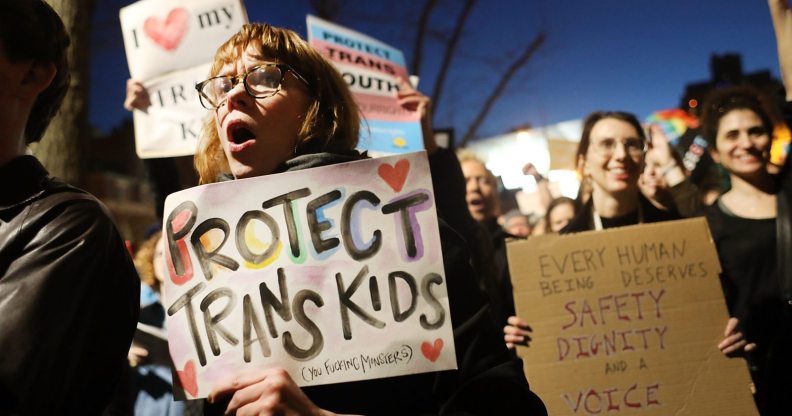This is what you need to know about the potential High Court case over trans kids using bathrooms

(Spencer Platt/Getty)
A 13-year-old girl has asked the High Court to review if trans schoolchildren should be allowed to use the bathroom corresponding to their gender identity.
This is despite a recent reminder from the Crown Prosecution Service that it is unlawful to force trans pupils to use the bathroom for the gender they were assigned at birth, rather than the bathroom corresponding to their gender identity.
The girl’s request for a judicial review against Oxfordshire County Council’s guidance on trans schoolkids’ access to bathrooms was filed with the High Court on February 5.
The potential case sees the teenage girl claiming that trans girls are boys.
Oxfordshire County Council’s guidance, Trans Inclusion Toolkit for Schools, was brought in a year ago and advises that schools treat trans children as their correct gender.
The council said it “utterly refutes” concerns that children are being put at risk and that its guidance is underpinned by the Equality Act 2010.
It added that it is “confident [the guidance]…provides help” in a “difficult and emotive area”.
The guidance states: “Children and young people are supported through the Equality Act 2010 to access the toilet that corresponds to their gender identity; so trans girls because they are girls, can use the girls’ toilets and trans boys the boys’ toilets.”
The lawyer for the 13-year-old girl previously told the BBC that the problem with Oxfordshire County Council’s guidance was “its bold assertion that ‘trans girls are girls and trans boys are boys'”.
“Under these guidelines I have no right to privacy from the opposite sex in changing rooms, loos or on residential trips,” the 13-year-old girl said. “The guidance makes me feel that my desire for privacy, dignity, safety and respect is wrong.”
Safe Schools Alliance and the High Court.
The girl is being supported in her attempted legal fight by the Safe Schools Alliance (SSA), a campaign group that claims to be a “grassroots group of individual volunteers” with no religious or political affiliation, according to the BBC.
But the SSA supports A Woman’s Place UK – an anti-trans political group set up with the express purpose of opposing potential reforms to gender-recognition laws in the UK.
SSA say that Oxfordshire County Council’s trans inclusion toolkit is “seriously flawed and poses a risk to children”.
The SSA crowdfunder for the legal action, which has raised more than £15,ooo, says the guidance “advises total affirmation of children who identify as trans” and that this “may be detrimental to their long term physical and mental health”.
This directly contradicts the most up-to-date evidence, which says that supporting trans children socially transitioning – like changing their name and pronouns – can reduce their rates of anxiety, depression and suicidal thoughts to almost the same levels as their cisgender counterparts.
Some trans teenagers will also ask for support in the form of being prescribed puberty-blocking medication, which is a safe and reversible treatment that can delay puberty until a trans teenager is old enough to make decisions about having gender-affirming medical treatment.
A landmark study in January 2020, published in medical journal Pediatrics, found that access to puberty blockers for a trans teen who wants them reduces their likelihood of trying to die by suicide in both the short and long term, as well as significantly reducing their likelihood of experiencing mental-health problems.
Single-sex facilities, trans people, bathrooms and the law.
Under the UK’s 2010 Equality Act, organisations must treat trans people as their correct gender when providing access to single-sex services, such as bathrooms.
There are “very limited circumstances” under which it’s lawful to treat transgender people differently when it comes to single-sex spaces, according to the Equality and Human Rights Commission.
Trans people may only be excluded from single-sex facilities if it can be proven that this is a “proportionate way to achieve a legitimate objective”.
An example given in the Equality Act’s exploratory notes is group counselling sessions for female victims of domestic abuse, where the presence of a trans woman might discourage other women from attending.

